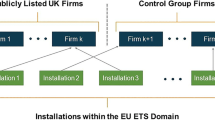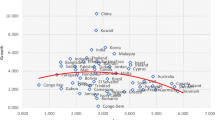Abstract
This paper proposes and tests a better-defined interpretation of the different responses of gasoline demand to tax changes and to market-related price changes. Namely, the signaling effect of gasoline taxes is one that impacts on long-run consumer decisions in addition to the incentives provided by tax-inclusive gasoline prices. Our hypothesis is tested using a complete demand system augmented with information on gasoline taxes and fitted to household-level data from the 2006 to 2013 rounds of the US Consumer Expenditure survey. Information on gasoline taxes is found to be a significant determinant of household demand additional to tax-inclusive gasoline prices. The equity implications are examined by contrasting the incidence across income distribution of a simulated $0.22/gallon tax increase to that of a market-related price increase equal in size. The tax increase is clearly regressive, slightly more than the market-related price increase. However, regressivity is by no means a reason to give up gasoline taxes as an instrument for reducing gasoline consumption externalities. Their high effectiveness in reducing gasoline demand implies that small tax increases can substantially improve the environment while minimizing the related distributional effects. Also, gasoline taxes generate revenue that can be used to offset their regressivity.
Similar content being viewed by others
References
Andersson, J.J.: Cars, carbon taxes and CO2 emissions, Grantham Research Institute on Climate Change and the Environment – Working Paper No.238, London School of Economics (2017)
Antweiler, W., Gulati, S.: Frugal cars or frugal drivers? How carbon and fuel taxes influence the choice and use of cars, Mimeo (2016)
Banks, J., Blundell, R., Lewbel, A.: Quadratic Engel curves and consumer demand. Rev. Econ. Stat. 79, 527–539 (1997)
Baranzini, A., Weber, S.: Elasticities of gasoline demand in Switzerland. Energy Policy 63, 674–680 (2013)
Barigozzi, F., Villeneuve, B.: The signaling effect of tax policy. J. Publ. Econ. Theory 8(4), 611–630 (2006)
Blaufus, K., Möhlmann, A.: Security returns and tax aversion bias: behavioral responses to tax labels. J. Behav. Finance 15(1), 56–69 (2014)
Brännlund, R., Nordström, J.: Carbon tax simulations using a household demand model. Eur. Econ. Rev. 48(1), 211–233 (2004)
Brockwell, E.: The signaling effect of environmental and health-based taxation and legislation for public policy: an empirical analysis, CERE Working Paper 2013:3, Umeå University (2013)
Brown, M.G., Lee, J.Y.: Incorporating generic and brand advertising effects in the Rotterdam Demand System. Int. J. Advert. 16, 211–220 (1997)
Browning, M.: Necessary and sufficient conditions for conditional cost functions. Econometrica 51, 851–856 (1983)
Browning, M., Meghir, C.: The effects of male and female labor supply on commodity demands. Econometrica 59(4), 925–951 (1991)
Busse, M.R., Knittel, C.R., Zettelmeyer, F.: Are consumers myopic? Evidence from new and used cars purchases. Am. Econ. Rev. 103(1), 220–256 (2013)
Chern, W., Loehman, E., Yen, S.: Information, health risk beliefs, and the demand for fats and oils. Rev. Econ. Stat. 77, 555–564 (1995)
Chernick, H., Reschovsky, A.: Is the gasoline tax regressive?, Institute for Research on Poverty Discussion Paper No. 980-92, University of Wisconsin-Madison (1992)
Chernick, H., Reschovsky, A.: Who pays the gasoline tax? Natl. Tax J. 50 (2), 233–259 (1997)
Chernick, H., Reschovsky, A.: Yes! Consumption taxes are regressive. Challenge 43(5), 60–91 (2000)
Davis, L.W., Kilian, L.: Estimating the effect of a gasoline tax on carbon emissions. J. Appl. Econ. 26, 1187–1214 (2011)
Deaton, A.S.: Theoretical and empirical approaches to consumer demand under rationing. In: Deaton, A.S. (ed.) Essays in the Theory and Measurement of Consumer Behavior. Cambridge University Press, New York (1981)
Deaton, A.S., Muellbauer, J.: An almost ideal demand system. Am. Econ. Rev. 70, 312–326 (1980a)
Deaton, A.S., Muellbauer, J.: Economics and Consumer Behavior. Cambridge University Press, New York (1980b)
Duffy, M.: Advertising in demand systems for alcoholic drinks and tobacco: a comparative study. J. Policy Model 17(6), 557–577 (1995)
EIA: Annual Energy Outlook 2014, US Energy Information Administration: Washington DC (2015)
EPA: Inventory of US Greenhouse Gas Emissions and Sinks: 1990-2014, US Environmental Protection Agency: Washington DC (2016)
Friedman, M.: A Theory of the Consumption Function, National Bureau of Economic Research. Princeton University Press, Princeton (1957)
Frondel, M., Ritter, N., Vance, C.: Heterogeneity in the rebound effect: further evidence for Germany. Energy Econ. 34(2), 461–467 (2012)
Ghalwash, T.: Energy taxes as a signaling device: an empirical analysis of consumer preferences. Energy Policy 35, 29–38 (2007)
Gillingham, K.: Identifying the elasticity of driving: evidence from a gasoline price shock in California. Reg. Sci. Urban Econ. 47, 13–24 (2014)
Hausman, J.A., Newey, W.K.: Nonparametric estimation of exact consumers surplus and deadweight loss. Econometrica 63(6), 1445–1476 (1995)
Heien, D., Wessells, C.R.: Demand system estimation with microdata: a censored regression approach. J. Bus. Econ. Stat. 8(3), 365–371 (1990)
Hughes, J.E., Knittel, C.R., Sperling, D.: Evidence of a shift in the short-run price elasticity of gasoline demand. Energy J. 29(1), 93–114 (2008)
Jensen, H.H., Kevasan, T., Johnson, S.R.: Measuring the impact of health awareness on food demand. Rev. Agric. Econ. 14, 299–312 (1992)
Kallbekken, S., Kroll, S., Cherry, T.L.: Pigouvian tax aversion and inequity aversion in the lab. Econ. Bull. 30, 1914–1921 (2010)
Kallbekken, S., Kroll, S., Cherry, T.L.: Do you not like Pigou or do you not understand him? Tax aversion and revenue recycling in the lab. J. Environ. Econ. Manag. 62, 53–64 (2011)
Kayser, H.A.: Gasoline demand and car choice: estimating gasoline demand using household information. Energy Econ. 22(3), 331–348 (2000)
Li, S., Linn, J., Muehlegger, E.: Gasoline taxes and consumer behavior. Am. Econ. J.: Econ. Policy 6(4), 302–342 (2014)
Liu, W.: Modeling gasoline demand in the United States: a flexible semiparametric approach. Energy Econ. 45, 244–253 (2014)
McCaffery, E.J., Baron, J.: Thinking about tax. Psychol. Public Policy Law 12, 106–135 (2006)
Martini, C.: The distributive effects of carbon taxation in Italy, Working Paper n. 103, 2009. Università degli Studi Roma Tre (2009)
Moro, D., Boccaletti, S., Sckokai, P.: Innovation and consumers’ choice. In: Galizzi, G., Venturini, L. (eds.) Economics of Innovation: the Case of Food Industry. Physica-Verlag, Heidelberg (1996)
OECD: Taxing Energy se 2015, OECD and Selected Partner Economies. OECD Publishing, Paris (2015)
Oladosu: An almost ideal demand system model of household vehicle fuel expenditure allocation in the United States. Energy J. 24, 1–21 (2003)
Parry, I.W.H., Small, K.A.: Does Britain or the United States have the right gasoline tax? Am. Econ. Rev. 95(4), 1276–1289 (2005)
Pollak, R.A.: Conditional demand functions and consumption theory. Q. J. Econ. 83, 70–78 (1969)
Pollak, R.A.: Conditional demand functions and the implications of separable utility. South. Econ. J. 37(4), 423–433 (1971)
Pollak, R.A.: The treatment of the environment in a cost-of-living index. In: Pollak, R.A. (ed.) The Theory of the cost-of-living-index. Oxford University Press, New York (1989)
Pollak, R.A., Wales, T.J.: Welfare comparisons and equivalence scales. Am. Econ. Rev. Papers Proc. 69, 216–221 (1979)
Poterba, J.: Is the gasoline tax regressive? In: Bradford, D. (ed.) Tax Policy and the Economy, vol. 5, MIT Press, pp. 145–164 (1991)
Pudney, S.: Modeling Individual Choice: the Econometrics of Corners Kinks and Holes. Basil Blackwell, Oxford (1989)
Remler, D.K.: Poor smokers, poor quitters, and cigarette tax regressivity. Am. J. Public Health 94(2), 225–229 (2004)
Rivers, N., Schaufele, B.: Salience of carbon taxes in the gasoline market. J. Environ. Econ. Manag. 74, 23–36 (2015)
Shonkwiler, J.S., Yen, S.: Two-step estimation of a censored system of equations. Am. J. Agric. Econ. 81, 972–982 (1999)
Scott, K.R.: Rational habits in gasoline demand. Energy Econ. 34(5), 1713–1723 (2012)
Small, K.A., Van Dender, K.: Fuel efficiency and motor vehicle travel: the declining rebound effect. Energy J. 28(1), 25–51 (2007)
Spiller, E., Stephens, H.M.: The heterogeneous effects of gasoline taxes, RFF discussion paper 12–30, resources for the future (2012)
Sterner, T.: Distributional effects of taxing transportation fuel. Energy Policy 41, 75–83 (2012a)
Sterner, T.: Fuel taxes, climate, and tax incidence. In: Sterner, T. (ed.) Fuel Taxes, and the Poor. RFF Press (2012b)
Sterner, T.: Fuel taxes: an important instrument for climate policy. Energy Policy 35(6), 3194–3202 (2007)
Teixidó, J., Verde, S.F.: Is the gasoline tax regressive in the twenty-first century? Taking wealth into account. Ecol. Econ. 138, 109–125 (2017)
Tiezzi, S., Verde, S.F.: Differential demand response to gasoline taxes and gasoline prices in the US. Resour. Energy Econ. 44, 71–91 (2016)
Wadud, Z., Noland, R.B., Graham, D.J.: Equity analysis of personal tradable carbon permits for the road transportation sector. Environmental Science and Policy 11(6), 533–544 (2008)
Wadud, Z., Graham, D.J., Noland, R.B.: Modelling fuel demand for different socio-economic groups. Appl. Energy 86(12), 2740–2749 (2009)
Wadud, Z., Graham, D.J., Noland, R.B.: Gasoline demand with heterogeneity in household responses. Energy J. 31(1), 47–74 (2010a)
Wadud, Z., Graham, D.J., Noland, R.B.: A semiparametric model of household gasoline demand. Energy Econ. 32(1), 93–101 (2010b)
West, S.A.: Distributional effects of alternative vehicle pollution control policies. J. Public Econ. 88(3-4), 735–757 (2004)
West, S.A.: Equity implications of vehicle emissions taxes. Journal of Transportation Economics and Policy 39(1), 1–24 (2005)
West, S.A., Williams, R.C.: Estimates from a consumer demand system: implications for the incidence of environmental taxes. J. Environ. Econ. Manag. 47(3), 535–558 (2004)
West, S.A., Williams, R.C.: Optimal taxation and cross-price effects on labor supply: estimates of the optimal gas tax. J. Public Econ. 91, 593–617 (2007)
Yen, S.T., Lin, B.: A sample selection approach to censored demand systems. Am. J. Agric. Econ. 88(3), 742–749 (2006)
Yen, S.T., Lin, B., Smallwood, D.: Quasi- and simulated-likelihood approaches to censored demand systems: food consumption by food stamp recipients in the United States. Am. J. Agric. Econ. 85(2), 458–478 (2003)
Author information
Authors and Affiliations
Corresponding author
Electronic supplementary material
Below is the link to the electronic supplementary material.
Appendix
Appendix
Rights and permissions
About this article
Cite this article
Tiezzi, S., Verde, S.F. The signaling effect of gasoline taxes and its distributional implications. J Econ Inequal 17, 145–169 (2019). https://doi.org/10.1007/s10888-018-9397-7
Received:
Accepted:
Published:
Issue Date:
DOI: https://doi.org/10.1007/s10888-018-9397-7




